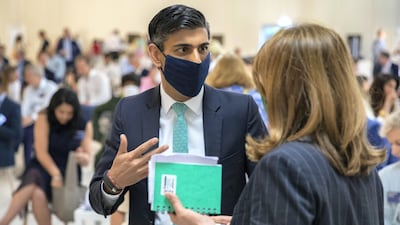Chancellor of the Exchequer Rishi Sunak said that Britain's economic recovery from the Covid-crisis is not guaranteed as he warned of the risks of rising interest rates and inflation on public debt.
Mr Sunak, who was speaking on the eve of opening the new UK Infrastructure Bank in Leeds on Wednesday, which aims to help deliver the country's climate ambitions while boosting jobs and growth, said he hoped Britain was over the worst but he was still focused on securing the future.
“Hopefully we’re through the crisis phase of this,” he told GB news in a television interview.
“I’ve got one eye on the future, I want to make sure we’re protected against risk.”
He said he would “invest in our children’s future, not have them paying for the spending of the past”.
Mr Sunak said rising prices are one of his near-term concerns, as UK inflation surged unexpectedly by 2.1 per cent on Tuesday, past the Bank of England’s target for the first time in almost two years.
However, he said there was no sign that expectations for higher inflation were becoming entrenched as the economy bounces back from its coronavirus lockdowns.
"That's different to what's happening in the US so I think actually here, people's expectation is inflation will remain at target over the medium term, but of course that's one of the many risks that it's my job to worry about," Mr Sunak said.
“As interest rates and inflation change, that has an impact on our debt.”
The government has spent heavily over the past year on job support and health measures to prop up the economy during the crisis and prevent unemployment from soaring out of control.
Borrowing in the 2020/21 financial year hit £300.3bn, or 14.3 per cent of annual economic output, the highest share on this measure since the end of the Second World War.
However, with the country still governed by Covid-19 movement restrictions, borrowing in 2021-22 is still expected to total more than £200bn, or 10 per cent of GDP, with Mr Sunak under pressure to deliver on his pledge to balance day-to-day spending and revenue by the middle of the decade without further tax increases.

Pressed on how he might raise extra revenue to close Britain’s deficit, Mr Sunak repeatedly declined to commit to maintaining the government’s “triple lock” policy on pensions.
Introduced by the Conservatives in 2010, it is a guarantee to raise the state pension by the highest of three measures: annual growth in average earnings, inflation, or 2.5 per cent.
The latest figures show average wages grew 8.4 per cent in the 12 months to April as millions of employees returned to work, which means that could be to used to calculate the state pension next year at a cost to the Treasury of £7bn.
Mr Sunak said there would be a statutory review of the policy in the Autumn and that it remains the government’s position for now, though he refused to comment on future spending decisions outside of fiscal events such as a budget or spending review.
The finance minister also said there would be would be no return to austerity after he spent £350bn on Covid support during the pandemic.
However, he said he wanted to protect the country against shocks ahead and not leave Britain's debt to be paid for by future generations
"That does require a bit of focus and prioritisation," Mr Sunak said.
Mr Sunak’s interview was recorded the night before he opened the UK Infrastrucuture Bank (UKIB) which aims to accelerate investment into infrastructure projects, cut emissions and support the government’s bid to level up every part of the UK economy.
Mr Sunak said the bank will help the government invest billions of pounds ”in world class infrastructure” that will support people, businesses and communities across the country.
While the chancellor acknowledged that tackling climate change would expensive with “costly transitions”, he said the future green economy will also offer “opportunities” with the government committed in investing to ensure people are supported through the transition.
In his March budget, Mr Sunak said UKIB would support regional economic growth and help eradicate the north-south divide in Britain.
The bank will receive an initial £12 billion of capital and £10bn in government guarantees, with hopes it will help to unlock more than £40bn of private sector investment.
The lender’s £22bn of financial capacity will allow it to issue loans, equity and guarantees on private projects with plans to ramp up its lending over time to local authorities.
It is part of the government’s plan to deliver more than £600bn in gross public sector investment over the next five years, the highest level as a proportion of GDP since the late 1970s.
Chris Grigg, chair of the UKIB said the bank will be “a catalyst for investment to support regional economic growth and net zero ambitions”.


